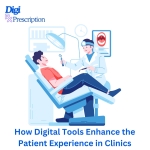
How Digital Tools Enhance the Patient Experience in Clinics
The integration of digital tools in clinics has redefined the patient experience, making healthcare more accessible, efficient, and personalized. From streamlined appointment booking to digital prescriptions, technology is reshaping how patients interact with healthcare providers. This blog delves into how digital tools enhance the patient journey, improve satisfaction, and build stronger doctor-patient relationships.
Key Ways Digital Tools Enhance the Patient Experience
1. Easy Appointment Scheduling
Digital appointment systems allow patients to book, reschedule, or cancel appointments with ease.
- Advantages:
- 24/7 booking access through websites or apps.
- Automated reminders reduce missed appointments.
- Customizable scheduling ensures reduced wait times.
2. Telemedicine for Remote Care
Telemedicine platforms enable patients to consult doctors from the comfort of their homes.
- Benefits:
- Saves travel time and costs.
- Provides access to specialists in remote areas.
- Ideal for follow-ups and minor consultations.
3. Real-Time Health Monitoring with Wearables
Wearable devices sync with clinic systems to provide continuous patient health data.
- Examples:
- Tracking heart rate, blood pressure, or glucose levels.
- Alerts for potential health risks.
- Better chronic disease management through ongoing monitoring.
4. Digital Prescriptions and Medication Management
Digital prescription systems reduce errors and streamline medication management.
- Why Patients Love It:
- Easy access to prescriptions via email or patient portals.
- Improved accuracy compared to handwritten prescriptions.
- Automatic reminders for medication refills.
5. Faster and Secure Billing Systems
Digital payment solutions like PayPal and Stripe simplify the billing process.
- Impact on Patient Experience:
- Multiple payment options for convenience.
- Transparent billing with detailed receipts.
- Secure transactions that build trust.
6. Access to Health Records Anytime
Patient portals provide instant access to medical history, test results, and prescriptions.
- Advantages for Patients:
- Empowered to make informed decisions about their health.
- Reduced dependency on clinic visits for reports.
- Enables seamless second opinions or specialist consultations.
7. Personalized Care Through AI and Data Analytics
AI-driven systems help doctors deliver customized treatment plans.
- How It Enhances Experience:
- Recommendations based on patient-specific data.
- Faster diagnosis and treatment.
- Improved outcomes for complex conditions.
How Clinics Can Implement Digital Tools Effectively
- Start Small: Introduce basic tools like online appointment booking and digital prescriptions.
- Focus on Usability: Choose platforms that are intuitive for patients of all ages.
- Ensure Data Security: Protect patient data with robust encryption and compliance with privacy laws.
- Train Staff: Provide thorough training to ensure seamless integration of digital tools.
- Request Feedback: Use patient surveys to refine and improve digital services.
Real-Life Example: A Patient’s Journey with Digital Tools
Meet Rahim, a 45-year-old professional living in Dhaka. Using his clinic's app, Rahim:
- Booked an appointment with his cardiologist in minutes.
- Attended a telemedicine follow-up after his initial in-person consultation.
- Received a digital prescription directly to his phone.
- Used a wearable device to monitor his heart rate, sharing data with his doctor remotely.
Rahim’s experience was convenient, efficient, and stress-free—all thanks to digital tools.
Conclusion
Digital tools are revolutionizing patient care by simplifying processes, enhancing communication, and improving access to healthcare. For clinics, adopting these technologies not only enhances patient satisfaction but also builds a reputation for innovation and quality care. As the demand for digital solutions continues to grow, clinics that prioritize patient-friendly tools will lead the way in delivering superior healthcare experiences.
